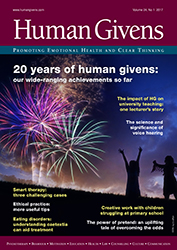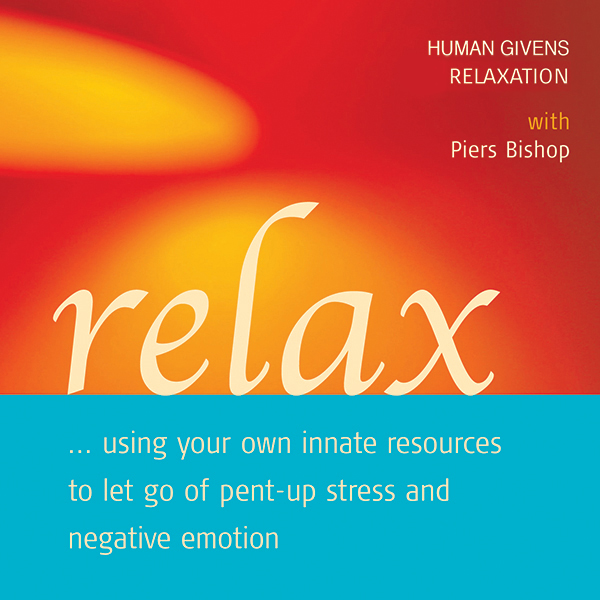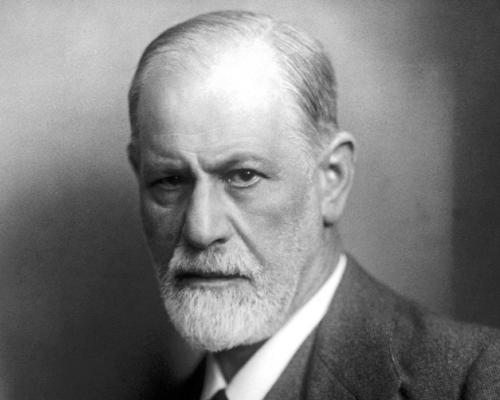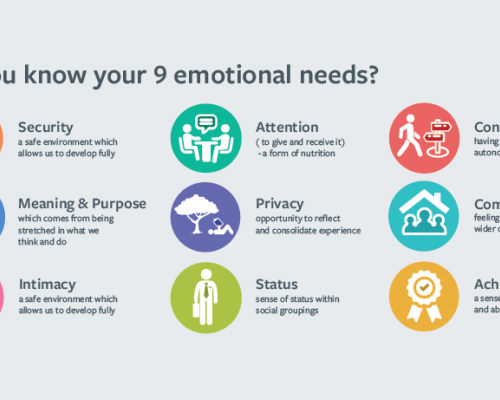The power of deep relaxation and guided imagery
Dr Farouk Okhai describes the power of using deep relaxation and guided imagery techniques.
LIKE all human givens oriented therapists, I make considerable use of the deep relaxation state. Because emotional arousal focuses and locks attention, it is only when anxious or depressed people are deeply relaxed, temporarily liberated from the interminable arousing personal worries and concerns that plague them, that they can, metaphorically, step back, take a wider perspective, and be guided to see different outcomes and options for themselves in their lives.
This was a very helpful approach to use with Nick, a quiet, clean-cut, 38 year old American referred to me for depression. Nick's father, a retired landscape gardener, had undertaken to create a garden behind Nick's newly built home, which at the time was just rubble. However, the project ceased to be straightforward when a neighbour dispute arose over drainage and boundaries of land.
The dispute became so bitter and Nick's father so dispirited that, quite suddenly, he took his own life. Nick blamed himself for his father's death, and couldn't stop thinking he should have taken his state of mind more seriously. He had been depressed ever since. He had moved back in with his mother, whose life he felt responsible for ruining. She too had become depressed and they had both started to drink heavily.

Before the suicide, Nick had been a well-liked, efficient manager, on the fast track to promotion. Afterwards, he had intermittently been off ill and, for some months now, had been on continuous sick leave for depression. Recently he was shocked to be called in and offered medical retirement.
When I met Nick, he was on 50mg daily (a high dose) of Seroxat (an SSRI antidepressant) and had seen three separate counsellors, none of whom he had found helpful. Their efforts to convince him that his father's suicide was not his fault had particularly annoyed him. He spent his time ruminating about actions he could have taken to prevent the tragedy and worrying about his mother. Gentle probing revealed that his friends had gradually dropped him and he had ceased to take part in activities he used to enjoy, such as squash and rambling.
Calming down
The first step was to help him to calm down. I taught him the 7/11 breathing technique that I had shown Beth and I also took him through a 20-minute gradual relaxation exercise, during which I reminded him of his past work successes and latent talents, and reframed the enforced medical retirement as the opportunity to choose a new career. I asked him to repeat the 7/11 relaxation exercise for 15 minutes three times a day, to help him to think clearly; to start playing squash again and to look into going to an evening class.
The aim was to focus his attention outwards and get him mixing with people again. We agreed that he would keep an alcohol diary, so that he could identify his drinking triggers and learn accurately, rather than guess, how much he was drinking. (I was careful not to tell him to cut down. Most people hate being told not to drink, and I hoped that, once he became more aware of his drinking, he would want to cut down.) With the help of his GP, he was going to start cutting down his antidepressant use by 10mg every fortnight or so.
I next saw him eight days later. He instantly admitted that, although he had found the relaxation useful, he had practised it only once or twice. It is important to emphasise what someone has done, rather than what they have failed to do, so my response was, "It's really good that you did it once or twice. It will become a habit that you will do more and more", embedding the suggestion that he would do so.

Nick had realised, from his drinking diary, that his alcohol use decreased when he was distracted. He had managed to keep to between three and six units a day, except for once when, in a pub with friends, he drank 13 units. The antidepressant was down to 40mg a day. However, he was anxious as a result of a visit by his immediate boss who had suggested that he fight the medical retirement. We did a relaxation in which, during his deeply relaxed state, I invited him to consider the pros and cons of returning to his old job.
Two weeks later, Nick arrived looking well. His antidepressant was down to 30mg a day; he had reached a final settlement with his employer; he had continued with playing squash; and he was drinking just two to three units of alcohol a day. (He had had another slip when he drank excessively at the pub, and had now decided to avoid those particular friends, as he couldn't control his drinking when with them.) We discussed careers advice, enrolling in an evening class and the possibility of his setting up as a painter and decorator, which he had an interest in. Again, we did a guided visualisation, in which I invited Nick to think creatively about his future.
More success
And so it went on. Each session he reported, and I affirmed, more successes. His antidepressant use was, first, down to 20mg daily, then 10mg daily, then 10mg every other day and then discontinued altogether. He had started rekindling his relationships and had gone back to rambling.
It was then, when asked if he had any other goals for therapy, that Nick said that he wished he could stop feeling guilty about his father's death. I knew that I should not to try to persuade him that he wasn't to blame. That was what previous counsellors had tried, to his annoyance. I drew a pie chart and asked him to attribute portions of the blame for the suicide to all the parties involved — the neighbours, the workers, the surveyor, the council, his father and himself.
I was careful to leave his portion of the blame till last. By the time we got to him, over 100 per cent of the blame had already been allocated. We did it again — but Nick was not happy with the result. So we did it again and again until Nick said, "I see what you are getting at: it's not that simple". I then told him a story of a murderer being taken to the gallows. Whose fault was it? His for committing the murder? The victim for being in the wrong place? The knifemaker for making the knife which the murderer used? His parents for not bringing him up right? Society for not providing schooling and opportunities for him? The police for not paying heed to the warning signs? The judiciary for not sentencing him for life for a previous conviction? Nick has not mentioned the guilt since that session.
Nominalisations
Nick firmly decided on painting and decorating as a new career but he needed an interim job while he got up to speed on skills, and was worried that he might not be able to cope with the pressure. The human givens approach stresses utilising one's resources. I asked Nick about previous times when he had been under such pressure and coped, and he gave me two examples. "So you do have the resources to cope," I told him. "They just need brushing up", he agreed.
I induced a deep relaxation, during which I suggested that he review all the times he had coped successfully and retrieve all the strengths, resources, talents, abilities, experience, knowledge, persistence and determination that he needed to succeed now. These abstract words are nominalisations, words with no intrinsic or sensory meaning. Positive nominalisations can be powerful because they send the listener on an inner search to recall positive experiences that match their personal understanding of the words. (Negative ones like depression and misery are, for the same reason, to be avoided.) Helping Nick visualise success instead of failure was key to his recovery.
This short article is an aside to the 'Why psychiatrists should be more like plumbers' article.
"Human Givens Journal" Volume 10 - No. 3: 2003
 Spread the word – each issue of the Journal is jam-packed with thought-provoking articles, interviews, case histories, news, research findings, book reviews and more. The journal takes no advertising at all, in order to maintain its editorial independence.
Spread the word – each issue of the Journal is jam-packed with thought-provoking articles, interviews, case histories, news, research findings, book reviews and more. The journal takes no advertising at all, in order to maintain its editorial independence.
To survive, however, it needs new readers and subscribers – if you find the articles, case histories and interviews on this website helpful, and would like to support the human givens approach – buy a back issue today.
Latest Tweets:
Tweets by humangivensLatest News:
HG practitioner participates in global congress
HG practitioner Felicity Jaffrey, who lives and works in Egypt, received the extraordinary honour of being invited to speak at Egypt’s hugely prestigious Global Congress on Population, Health and Human Development (PHDC24) in Cairo in October.
SCoPEd - latest update
The six SCoPEd partners have published their latest update on the important work currently underway with regards to the SCoPEd framework implementation, governance and impact assessment.
Date posted: 14/02/2024














